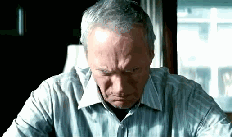So, we wear our white coats and hospital-approriate attire, get lost twice in the hospital because we have no clue where we are going, and show up right on time to our clinic.
Our clinic, with our patients.
Our patients, two bananas.
Yes. I performed my first FNA on a banana. And I talked to it. I said, "Ok, Mr. Banana, you are going to feel a slight pinch on three..... 1...2....3.....There we go..... just a few more seconds.... I'm going to remove the needle now.... aaaaand.... we're done!"
Bananas, and fruit in general, are great patients because who gives a crap if you mess up. The funny part is, even though it is a banana, we all still get nervous performing the procedure because we are being watched by our peers and our preceptor. Now, after successfully performing my FNA on Mr. Banana, and creating a beautiful slide might I add, I would feel 10x more confident doing it on a real patient.
 |
| Banana Jesus? |
This got me thinking about all of the procedures we have to learn to perform, and how potentially terrifying it can be if we have to perform them on a real patient for the first time.
For you non-med folks, we basically learn how to take a history and perform a physical exam on Standardized Patients (SPs), who are community volunteers trained to assess us. Then, we have one week of training right before our third year begins, at which we practice the basics on each other. After that, thrown to the wolves!
I remember my first physical exam evaluation... my hand was shaking as I drew the H for the eye exam... my stethoscope got caught in my hair... and then the real kicker, I had my patient raise his hands during the musculoskeletal portion and WHOA! I got flashed. Totally forgot to give him a drape. Whoooops.
The second week of M2 year we have a physical exam evaluation that we have to pass in order to finish the year. I felt super accomplished when I waltzed in there... hair pulled back this time... immediately handed my patient a drape, performed everything without shaking, had time for lots of small talk, and finished 8 minutes early.
Obviously, the more time we spend with patients and the more practice we have, the more confident and successful we are at performing procedures, even if it is a basic physical exam.
Last year, I shadowed my mentor in Internal Med a lot. I would get there early in the morning, usually before she did, to peruse the board, chug a coffee, and scope out which residents I should make nice with. Eventually, some of the residents got used to me being there and would ask me to do things, obviously thinking I was a third year student and not just a mere first year. This is basically the normal conversations that I had:
Resident: "Hey, go grab an ABG from 25A"
Me: "Ok, what's an ABG?"
Resident: "Are you kidding me?"
Me: "No, that's okay, I can look it up."
Resident: "It's an arterial blood gas! What year..... ohhhh that's right. You're only an M1. Fine. I'll do it. Come with me and pay attention."
So, how do we learn to do the more invasive procedures? Well, cadaver lab is a good place for surgery. And shoe laces are great for surgical knots. The banana, an excellent patient. And then, there is each other.
My friend and I signed up to learn how to put in IVs last year.
Here is my hand afterwards:
I have learned to ask this question with all seriousness, "You want to practice what on me?"
Of course, my answer is still yes, as long as I get to practice it next.
Ouch.





No comments:
Post a Comment